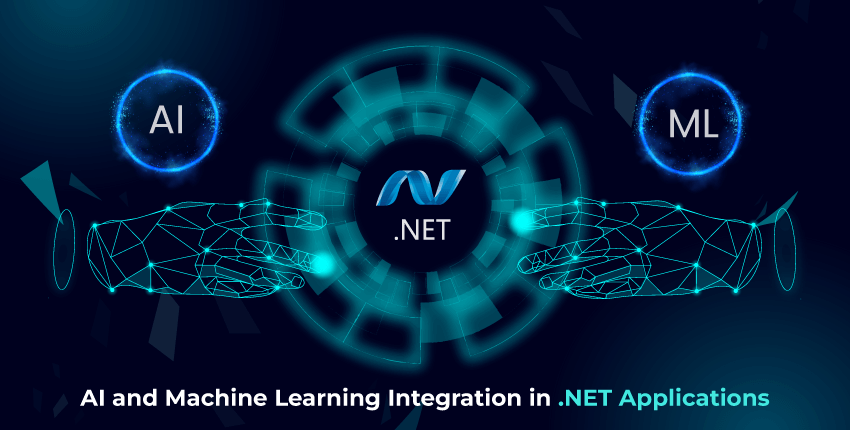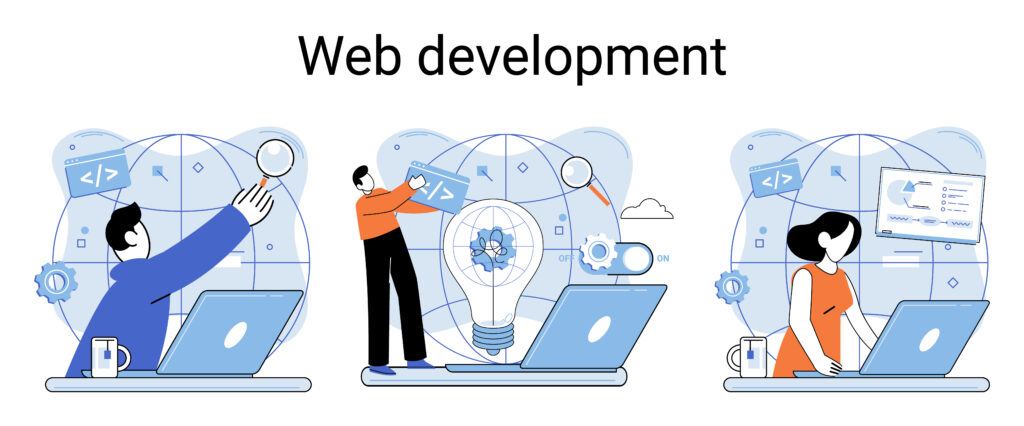Introduction:
In today’s rapidly evolving technological landscape, integrating (AI) Artificial Intelligence and Machine Learning (ML) into .NET applications has become a pivotal avenue for enhancing functionality, optimizing processes, and delivering intelligent user experiences. This blog digs into the seamless integration of AI and ML in .NET applications, shedding light on the reasons, benefits, libraries, frameworks, and real-world use cases.
Integrating AI and ML into .NET Apps:
Integrating AI and ML into .NET applications involves leveraging specialized libraries and frameworks compatible with the .NET ecosystem. Using these tools, developers can infuse predictive analytics, automation, fraud detection, personalization, and advanced analytics seamlessly into their applications. This integration brings forth a new era of user-centric, data-driven experiences. Integrating machine learning in ASP.NET applications enables predictive analytics, personalized user experiences, and tasks like image recognition, fraud detection, and sentiment analysis, enhancing web applications with intelligent insights and automation. By leveraging machine learning libraries like ML.NET or TensorFlow.NET, ASP.NET developers can seamlessly incorporate AI-driven functionalities into their web-based projects.
Reasons to Implement AI and ML in .NET Applications:
- Process Automation: AI and ML can automate repetitive tasks, which can reduce manual intervention and streamline workflows.
- Predictive Analytics: By analyzing historical data, ML algorithms can make accurate predictions, enabling informed decision-making.
- Recognizing Fraud: AI-powered algorithms can detect fraudulent activities and prevent potential financial losses.
- Personalization: ML models can analyze user preferences and behaviors, delivering tailored content and recommendations.
- Continuous Improvement: AI algorithms can learn from user interactions and feedback. Over time, this would lead to the enhancement of the application.
- Advanced Analytics: ML enables complex data analysis, uncovering insights that drive strategic business decisions.
- Virtual Assistants and Chatbots: AI-driven chatbots enhance user engagement by providing instant support and responses.
AI and ML Libraries and Frameworks Compatible with .NET:
Several powerful libraries and frameworks facilitate the integration of AI and ML into .NET applications, including TensorFlow, CNTK, Accord.NET, PyTorch, LightGBM, Dlib, ONNX, and ML.NET. These tools empower developers to leverage pre-built models, customize algorithms, and optimize performance.
- TensorFlow: TensorFlow is one of the most popular open-source machine learning frameworks widely used. While it is primarily associated with Python, TensorFlow also has a .NET binding called TensorFlow.NET. This allows .NET developers to leverage the ability of TensorFlow’s deep learning capabilities within their .NET applications.
- CNTK (Cognitive Toolkit): CNTK, developed by Microsoft, is another deep learning framework that is used for building neural networks. It offers high performance and scalability for training deep learning models. While its primary interface is in Python, there are .NET APIs available for CNTK, enabling .NET developers to work with neural networks and deep learning techniques.
- Accord.NET: Accord.NET is a versatile and comprehensive machine learning with a .NET core. It provides a wide range of libraries and tools for tasks such as image and signal processing, statistical analysis, and machine learning. It’s designed to be user-friendly and offers a variety of algorithms and techniques for data analysis and modeling.
- PyTorch: PyTorch is a popular open-source machine learning library that is primarily associated with Python. However, there is an effort to bring PyTorch support to .NET through bindings and interoperability. PyTorch offers dynamic computation graphs and is well-suited for research and experimentation in deep learning.
- LightGBM: LightGBM (Light Gradient Boosting Machine) is a gradient-boosting framework that greatly focuses on efficiency and speed. It is commonly used for tasks like classification, regression, and ranking. While it is implemented in C++, there are .NET wrappers available that allow .NET developers to utilize LightGBM’s powerful algorithms.
- Dlib: Dlib is a C++ library that offers machine learning algorithms and tools for multifarious tasks, including image processing, computer vision, and machine learning for .NET developers. It is recognized for its effectiveness and high level of performance. DotNET developers can interface with Dlib using appropriate bindings.
- ONNX: ONNX (Open Neural Network Exchange) is an open standard format for representing .NET core machine learning models. It enables interoperability between different frameworks and platforms. While ONNX itself is not a framework for machine learning using .NET, it can be used in conjunction with .NET and other frameworks to exchange models seamlessly.
- ML.NET: ML.NET stands as an open-source, cross-platform machine learning framework crafted by Microsoft. It is specifically designed for .NET developers and offers an approachable way to integrate machine learning models into .NET applications. ML.NET supports various ML tasks such as classification, regression, clustering, and many more.
These libraries and frameworks provide .NET developers with a range of options to integrate AI and ML capabilities into their applications. Whether it’s utilizing pre-trained models, building custom models, or processing and analyzing data, these tools offer the essential resources to enhance the intelligence and functionality of .NET applications.
Top Five Use Cases of AI and ML With .NET Applications:
- Predictive Maintenance: ML algorithms can predict equipment failures, optimize maintenance schedules, and lessen downtime.
- Customer Service: AI-driven chatbots enhance customer support by furnishing real-time assistance and resolving queries.
- Fraud Detection: ML models can analyze transaction patterns to identify and prevent fraudulent activities.
- Image and Video Processing: AI-powered image recognition and processing improve visual content analysis and manipulation.
- Natural Language Processing (NLP): ML algorithms analyze and understand human language, thus enabling sentiment analysis, language translation, and content summarization.
Use Case of Artificial Intelligence in .NET and Machine Learning in .NET:
Consider a scenario where an e-commerce application employs AI-powered recommendation algorithms to suggest personalized products to users based on their browsing and purchase history. This enhances user engagement, boosts sales, and provides a competitive edge. ML algorithms within a financial application could analyze transaction patterns to detect potentially fraudulent activities.
Conclusion:
The integration of AI and ML into .NET applications ushers in a new era of intelligent, data-driven experiences. By leveraging libraries, frameworks, and pre-built models, .NET developers can unlock the potential of AI and ML to automate processes, enhance user interactions, and make educated decisions. As businesses strive to stay ahead in the digital landscape, embracing AI and ML in .NET applications becomes an indispensable strategy.
Incorporating AI and ML into .NET applications is a forward-looking approach empowering developers to create innovative solutions with enhanced capabilities, improved user experiences, and data-driven insights. By embracing these technologies, .NET applications can achieve new heights of efficiency and intelligence.
Remember, choosing to integrate AI and ML into .NET applications depends on your project’s requirements, goals, and the specific AI/ML technologies you wish to utilize.
Frequently Asked Questions
The choice between .NET and Python for AI and ML depends on various factors, including your project’s requirements, existing skillset, and ecosystem. Python is widely known for its extensive AI and ML libraries and community support, making it a popular choice. However, .NET has made strides in AI/ML with libraries like ML.NET and TensorFlow.NET, offering integration options for .NET developers.
Yes, you can infuse AI and ML into .NET applications. There are dedicated libraries and frameworks, such as ML.NET, TensorFlow.NET, and Accord.NET, that allow seamless integration of AI and ML capabilities into your .NET applications.
Absolutely. DotNET Developers can leverage AI and ML libraries and frameworks that are compatible with the .NET ecosystem to integrate these technologies into their applications. Libraries like ML.NET provide tools and resources tailored to .NET developers.
Yes, DotNET apps can integrate AI and ML functionality. With the availability of specialized libraries and frameworks, developers can incorporate AI and ML capabilities to enhance their .NET applications’ features and user experiences.
Integrating AI and ML with .NET applications presents several advantages, including process automation, predictive analytics, fraud detection, personalization, advanced analytics, and the ability to create virtual assistants and chatbots. These technologies empower applications to make data-driven decisions and provide intelligent responses.
Common AI/ML use cases in .NET applications include predictive maintenance (e.g., equipment failure prediction), customer service chatbots, fraud detection algorithms, image and video processing, natural language processing for sentiment analysis, language translation, and content summarization.
While having AI/ML knowledge can be beneficial, it’s not always a strict requirement. Many AI/ML libraries and frameworks provide high-level abstractions that allow developers to integrate these technologies without in-depth expertise. However, a basic understanding of AI/ML concepts can help developers make better design and implementation choices.
Yes, you can use Microsoft Libraries and Frameworks to infuse AI and ML into .NET apps. Microsoft offers ML.NET, a cross-platform open-source framework, specifically designed for .NET developers to build custom ML models and integrate them into their applications.












